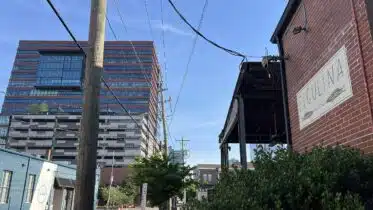By Isabel Lewis
Arthur Durham is keenly aware of the impact that gunfire and other street violence can have on a community.
As a boy growing up in Philadelphia, that was the world he lived in. His mother battled heroin addiction, and his father was absent.
“To say I had it hard would be an understatement,” Durham recalled during a recent interview with NC Health News. “I had my troubles in life — arrested several times, shot, stabbed, you name it.”
That was not the path Durham, now 49, wanted to continue on, and he intentionally changed course. After high school, he headed to Pennsylvania State University, where he earned degrees in human development and family studies. Soon after graduating, Durham began working in violence prevention.
Now, he’s bringing the expertise he has accumulated from his childhood and work in Philadelphia and New York to Greensboro, where a new violence interrupter program is being launched.
Curbing escalating homicide rates
This September, Greensboro had its 50th homicide of the year. If the killings continue at the same rate through the rest of the year, the city could surpass its record of 56 homicides that was set in 2020.
In an effort to curb increasing violence throughout the city, Greensboro plans to implement a violence prevention model created by Cure Violence Global.
The goal of Cure Violence is to “interrupt” potentially violent scenarios and transform the role of violence within communities. This is achieved through the intervention by so-called violence interrupters — community members who have been at risk of turning to violence at some point in their lives who are now trained to mediate conflicts and suppress the spread.
Cure Violence was founded in 2000 by Gary Slutkin, a physician and epidemiologist and former head of the World Health Organization’s Intervention Development Unit. Slutkin classifies violence as a contagious disease, advocating that it can be “prevented and treated using health methods.”
There are 22 cities in the United States with Cure Violence programs. In many of the areas where the model is used, shootings and homicides have dropped significantly, ranging from 40 percent to 70 percent, according to a 2021 report summing up studies done by the Cure Violence organization and independent evaluations.
Establishing Peace on Purpose
Greensboro created an Office of Community Safety in 2022.
The mission is to enhance public safety through collaboration with city officials and the Greensboro Police Department. Four branches have been created within the office — the Greensboro Criminal Justice Advisory Commission, Behavioral Health Response Team, Law Enforcement Assisted Diversion and Violence Prevention.
The violence prevention branch, also known as Peace on Purpose, was announced in April 2023 and is expected to be fully operational by the beginning of 2024, according to the city’s website.
Peace on Purpose will use the Cure Violence model.
Durham, who’s been tapped to lead the Peace on Purpose branch, spoke with NC Health News this summer about how he got into this work and the program.
Durham spent the majority of his violence prevention career in Harlem working for Street Corner Resources, a program designed to give youth from troubled neighborhoods greater access to jobs, educational opportunities and tools to help them succeed. It was there that Durham began to believe he was making a real impact.
After a three-year period in which there were no homicides from gun violence in the Harlem area that Street Care Resources had been focusing on, Durham saw for himself the significant impact that violence intervention could have on a community.
In 2017, Durham moved to Greensboro because his wife got a job at UNC Greensboro.
Although his full-time job wasn’t doing violence prevention work initially in North Carolina, Durham had many connections within Cure Violence.
Durham said he was surprised when he began to hear through those circles that there was interest in starting a violence interruption program in his new home. Greensboro’s homicide and gun violence rates were nowhere near what he had experienced in Philadelphia and New York.
Nevertheless, Durham realized that the increasing violence was unusual for the city, so he decided to take an active role in addressing it.
Role of violence interrupters
When starting a Cure Violence program, “target areas” must be identified, Durham said. These areas are where the bulk of homicides, fights, gang activity and violence occur throughout a city.
Although there is a target area, Durham said, “violence moves” — target areas don’t stay the same. Smith Homes, a public housing complex in Greensboro, used to be one of the most violent areas in the city, according to Durham. That is no longer the case. Some of the areas Peace on Purpose is focusing on now are streets in the northeast and southeast sides of Greensboro.
Once the target areas are identified, recruitment begins for violence interrupters who have previous experiences with gangs. Those exposures give them an edge in reaching out to and talking with active gang members. The team goes into “target area” neighborhoods and gives community members who know the area — and who may have even been involved with the violence in the neighborhood — the opportunity for a job and a stable income.
Durham said one of the goals of Greensboro’s Office of Community Safety is to make employees “feel appreciated doing this work.” Many violence interrupters come from a lifestyle where they were making “fast money.” To encourage people to change their way of life, Durham wants to make sure they think it is worth it. He hopes violence interrupters will make at least $20 an hour.
Before hitting the streets, the new recruits will be taught to mediate situations. There is a series of tests and simulations they must pass.
Once violence interrupters go through the extensive training, they become the ones who “get people to put the guns down,” Durham said. The team members are likely to deal with everything from small fights to domestic disputes. They are called for “anything that can manifest somebody pulling out a gun and shooting,” he said.
Durham hopes that in the next few years, Greensboro will be able to hire more than 50 violence interrupters, ensuring that people are available throughout the year.
For the violence prevention program to be successful there needs to be “total community buy-in,” Durham said. To encourage community buy-in, he has been working for the past few months on building relationships with organizations throughout Greensboro that can support violence prevention throughout the city.
Shift from traditional policing
Durham believes that violence arises from individuals and communities that lack resources.
”They’re lacking structure, family-wise or community-wise,” he said. One way to help communities, he said, is investing in them. Others share his sentiment.
Sign up for our Newsletter
“*” indicates required fields
In recent years, there has been a growing effort to move away from traditional policing and find new ways to confront social issues that often elicited law enforcement involvement such as gun violence, homelessness, insecure housing dilemmas and addiction.
This shift is exemplified by The Breathe Act, a proposed federal omnibus bill that calls for a nationwide movement encouraging investment “in new approaches to community safety.”
Rather than relying solely on law enforcement officers, whose training might not encompass handling crises involving people with mental health or substance abuse issues, cities like Greensboro have been publicizing an effort to have community engagement with city leaders and the police department. That is why the Office of Community Safety was formed.
This collaboration provides an opportunity for issues to be addressed in a manner beyond traditional policing and incarceration. Instead, the focus centers on understanding the underlying factors that lead individuals to their current circumstances — and then intervening to provide support and assistance.
Other cities embrace new approach
Other cities in North Carolina are following Greensboro’s lead and taking a new approach to community safety that doesn’t all fall to the police.
Fayetteville is working to start an Office of Community Safety. Lisette Rodriguez, a community activist and Fayetteville native, founded Say Yes to OCS last year after the Fayetteville City Council’s struggle to get the one extra vote needed to create a new office.
In June, the city of Fayetteville finally got the final vote needed, and an Office of Community Safety was born. “The next step is to get that director hired,” Rodriguez said in an interview. Rodriguez said the office they are hoping to develop is inspired by the model Greensboro is using, including having a Violence Prevention branch.
Building a movement
Mary Houser, who oversees the Law Enforcement Assisted Diversion branch of the Office of Community Safety in Greensboro, said that the best way to reduce violence and recidivism in prisons is by providing individuals with assistance.
Houser, who is working with Durham as she develops her program, has been collaborating closely with the Greensboro police department.
Houser’s focus is on assisting individuals grappling with poverty, addiction, engagement in sex work and other issues.
To help those individuals, Houser says, not only do tough questions need to be asked, but communities need to come together to hammer out the answers.
“How did we get here?” Houser says she asks. “How do we need to fix this, so that this type of offense you have committed doesn’t happen again?”
Those are questions that Durham hopes to help communities struggling with violence answer too.
“Peace on Purpose is a movement,” Durham says.








